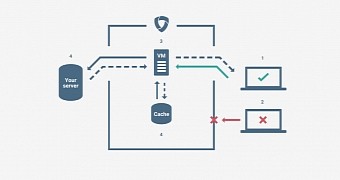Three days after taking down his website because of a massive two-week-long DDoS attack, Brian Krebs has returned online with the help of Google's Project Shield initiative.
Launched in February 2016, Project Shield is a Google initiative that aims to provide technical support for smaller news organizations, human rights, and/or elections monitoring services.
One of the services Project Shield provides is free DDoS protection, which Krebs desperately needed and that can easily cost a company or individual more than $100,000 per year.
Krebs has always benefited from free DDoS mitigation
For years, Krebs, a famous investigative journalist who has exposed many cyber-crime campaigns, has benefited from free DDoS protection from Prolexic, a company later acquired by Akamai, who also honored this deal.
After Krebs exposed vDos, the Internet's most popular DDoS-for-Hire service, his site was under a barrage of DDoS attacks for weeks.
For the first hours, the attacks were small and even grew to 128 Gbps after a day. After ten days, the attacks reached mammoth levels, easily becoming the largest DDoS attack ever recorded at 620 Gbps.
Two days after this mammoth DDoS attack hit, Akamai fended off the malicious traffic. But things eventually started breaking down, and the company started having technical problems that affected the operational service of its paying customers. As such, on Wednesday, the company unloaded Krebs' blog off their network. Krebs said he holds no grudge against Akamai for protecting its true customers.
Krebs' site was offline three days
Since he knew his ISP couldn't handle all the traffic, Krebs took down his website for good, trying to avoid problems for innocent third parties.
Other DDoS mitigation services offered their help, but Krebs said that they only granted him two-three weeks of free protection, after which he needed to pay like all the other regular customers, a cost he couldn't afford.
That's where Google stepped in to help, with a project that seemed like a PR stunt when it was first launched in February, but now has come to show its true worth.

 14 DAY TRIAL //
14 DAY TRIAL //